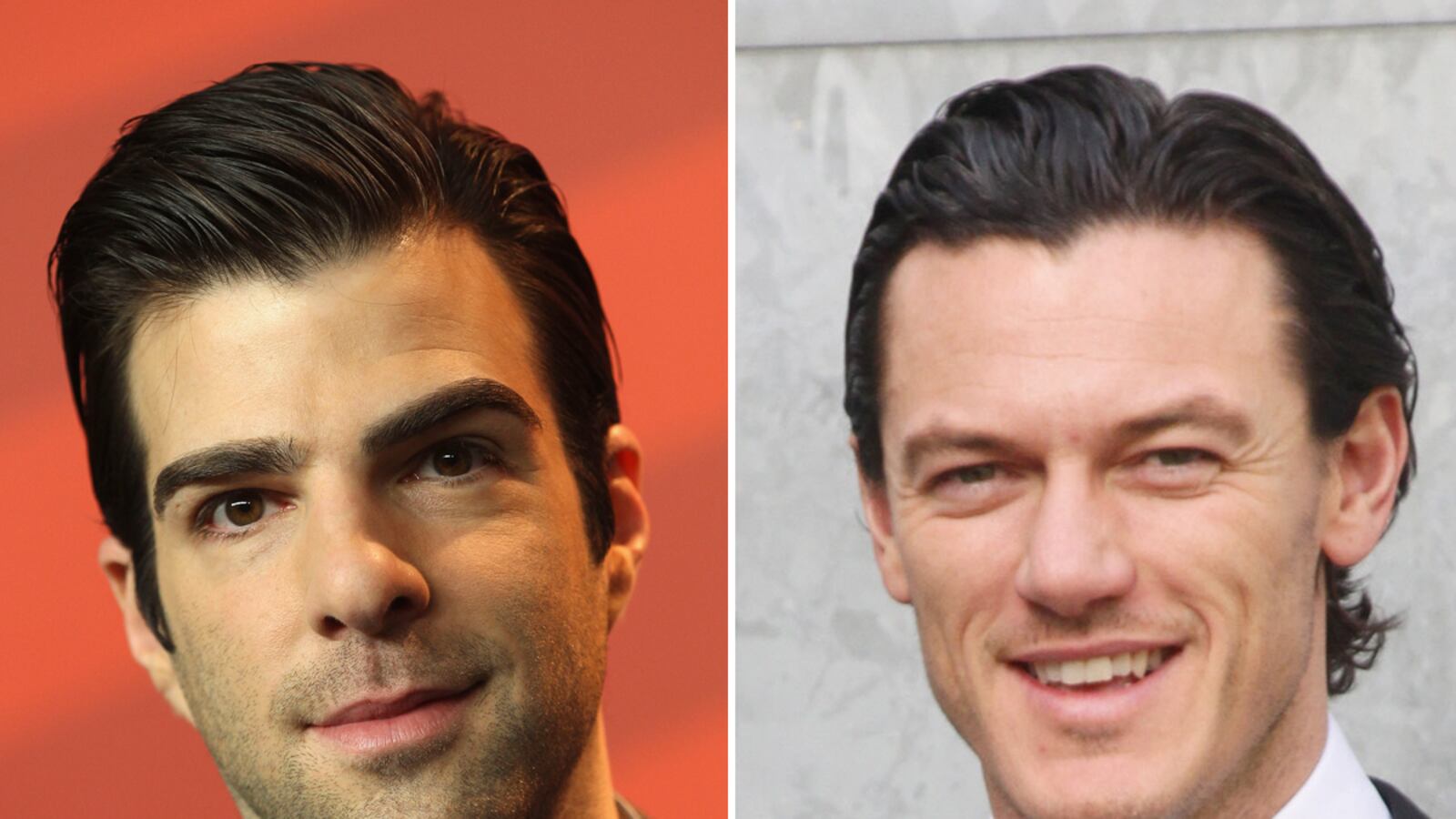Last week, Zachary Quinto, best known for playing Spock, casually came out as gay to New York magazine, in a tossed off aside in part of a longer feature story that barely focused on his frank admission about his sexuality.
Though he later posted an eloquent and moving statement on his website further explaining why he finally chose to come out, his directness brought to mind another burgeoning blockbuster star, Luke Evans, who found himself in the news after alert Internet watchdogs at the gay news website AfterElton noticed his Wikipedia page had been scrubbed clean.
Evans, now 32, started his career on the stage in London—working his way up from fringe productions to roles in Rent, Taboo, and Avenue Q. Now that he’s crossed the pond, he's embarking on a high-profile career in movies. He co-starred in the current release The Three Musketeers, next month he will be seen as Zeus in Immortals, and in March will star opposite John Cusack in The Raven. By the time his biggest vehicle, The Hobbit, comes out in Dec. 2012, we can assume that many Americans will know who he is.
But in 2002, Luke Evans gave a very clearheaded and witty interview to The Advocate about his role in Boy George’s play Taboo and talked openly about being out and gay. That bit of info was briefly gone from his Wikipedia page.
Nearly 10 years later, he seems to be doing a backward dance—if not into the closet, at least behind a smokescreen. He has given interviews in women’s mags that obliquely reference a special “someone” and items have appeared in newspapers stating that he’s dating a female publicist in London.
Attempts to reach his publicist were not returned, but his representative told AfterElton after the Wikipedia controversy: “I do not comment on my clients' personal lives in the media. As for Luke, he did so once, a long time ago when he was an inexperienced, young actor and now with maturity and hindsight, he has learned not to engage the press in his personal life again.”

But if we are to believe his candid interview in 2002, Evans is still gay (or at the very least, bisexual).
And that means Luke Evans could be our first gay action star. The question is: Is America ready for him?
“We don’t have an out male action hero, yet,” said Howard Bragman, the Hollywood publicist and vice chairman of Reputation.com. Bragman, who’s helped myriad gay and lesbian actors and sports stars come out—including Meredith Baxter, Dick Sargent, and Sheryl Swoopes—thinks Evans would be as good a pioneer as anyone. “He’s a wonderful actor, he’s got great composure, he’s very articulate.”
And Bragman thinks that the tide has turned, culturally. “Pop culture, public sentiment, and politics all sort of move in alignment, OK?” said Bragman. “Politics is probably the last, the slowest; pop culture the first, public sentiment follows and then the political cover is there. But they all work together. Pop culture is huge. Somebody coming out still is huge. And look at the landscape. Look at how many openly gay people you have on network television.”
Plus, he says, actors coming out today have a far smaller hill to climb than previous generations.
“Especially when you are talking about a moviegoing audience basically, the 15-to-35 age group—they absolutely do not care. This is a crowd that’s 67 percent in favor of gay marriage, gay rights. It’s a non-issue. The younger you go, the more they don’t care, because of the visibility,” he said. “Can you ever grow up and watch Will and Grace and Modern Family and ever be intimidated by a gay person again?”
Paris Barclay, the man who interviewed Evans in The Advocate in 2002, says America might accept an openly gay action hero, too, but he has a caveat. Barclay has been out in Hollywood since the '90s, he’s made his name as a prolific television director and producer, working on Sons of Anarchy, Glee, In Treatment, and many others, casting and directing gay actors in straight roles and straight actors in gay roles.
He said, “I do believe that America would accept an out gay action hero,” but thought there was one line that people were not yet ready to cross.
“Whether they would accept an out gay romantic lead, I am not so sure.”
He chalks this up to the lack of mystique in our celebrity culture—and the ownership that people have of their favorite actors. If an actor in Twilight were to come out, he said, “Young people would know they were gay and they would have difficultly separating that knowledge from the real person and what the real person is doing from what they are seeing on the screen, and I think that would be tricky. Would they want to put the posters up?”
Barclay pointed out that while Neil Patrick Harris frequently plays “straight,” he’s rarely in a non-comedic romantic role. “He’s not playing someone who has to fall in love and kiss a girl and seduce her and be in those directly romantic situations.”
Both men say that Hollywood is ruled by fear—it’s not so much that the industry is homophobic, but that no one wants to stick their neck out for fear that their project fails.
“Too many of them are afraid of taking the chance and it not working and it blowing back on them and them getting fired,” said Barclay. “It’s easier to go with the guy you know has the girlfriend, the guy you know who walks the red carpet, dates Paris Hilton.”
“Nobody wants their movie not to succeed because they think there may be a homophobic element out there and wouldn’t see him as an action hero,” said Bragman. In the case of someone like Luke Evans, said Bragman, “I would say let the chips fall where they may… if they like him, they like him. You know, The Green Hornet starred a straight guy, and it didn’t do that well, did it?”
Still, as the number of out actors grows, the shock factor shrinks. While Quinto’s coming out shocked no one in Hollywood, for some knowing that Spock is gay might come as a surprise. Bragman points out that how much an actor’s career is affected has to do with the public persona he has already. “As I always say, there’s duh and wow, OK?” he said. “Ricky Martin, Clay Aiken— those are probably more duh; and Chely Wrights in the country world, or a professional athlete coming out—those tend me to be more wow.” Quinto, he said, “was closer to a duh than a wow. It wasn’t a well-kept secret in the industry—but there’s a big difference than being known in the industry and coming out and saying ‘I’m a gay man.’ And that’s a huge bridge to cross. I think he did it beautifully, I think he did it authentically to him.”
These days—in a time when openly gay actor Neil Patrick Harris can bring box office results in family films like The Smurfs and host the Emmys— the question isn’t: Do you want a career or do you want to be out? It’s, what kind of career do you want? If you are open, you might not become the next Russell Crowe, but you could have a more interesting path. Quinto and Evans are, in a way, taking a parallel ride; but while the former might be seen more as a character actor; the latter, as Barclay put it, “might be a Captain Kirk,” and as he noted: “There are different dollar signs on different kinds of roles.”
Now, a young actor has a choice: “I have a practiced line,” Barclay said of the advice he gives. “You have to sit down with a piece of paper and you have to decide what’s important to you. Is it really important to you to live your life openly and be comfortable, or is it more important to have the good things in life that come with being a huge success? In which case, you are going to have to lie.”
Though he doesn’t necessarily think that’s the wisest choice. “We’re in this period where it seems like suicide seems like it’s a viable option for kids who are hated because they are gay, and because of that there’s a little bit more heat on actors and people in the public eye to stand up,” he said. “Sometimes people will say, ‘That’s not so important to me. I’m not here to represent. I’m not here to be a political personality, just do my art, and do my craft.’”
Those who don’t take the political path, he warns, might regret it. “Because when you are done, you haven’t made a real difference, you will have just made some movies.”
Though the verdict is out on how Luke Evans will handle his sexuality in the future, originally he was quite adamant about being out. He told Barclay in The Advocate: “It's not a big issue, and it's never going to be a big issue for me; whether I'm successful or if I weren't successful, at least I'll never have that skeleton in the closet they can rattle out. Y'know what I mean?”
As for Quinto, in his blog post, he explained that his decision was fueled in part by the news that another gay teenager, Jamey Rodemeyer, had killed himself; a fact made worse by the knowledge that the teen had filmed a gay-rights video for the “It Gets Better” Project.
“In light of Jamey's death—it became clear to me in an instant that living a gay life without publicly acknowledging it is simply not enough to make any significant contribution to the immense work that lies ahead on the road to complete equality,” wrote Quinto.
The road to complete equality—it’s long, but Barclay believes there’s an end in sight: “How do we change the world? That’s my question,” he said. “I have an answer for that. It’s one actor at a time and it’s happening. It’s one actor at a time standing up and saying I’m gay and I’m still going to have a career."






